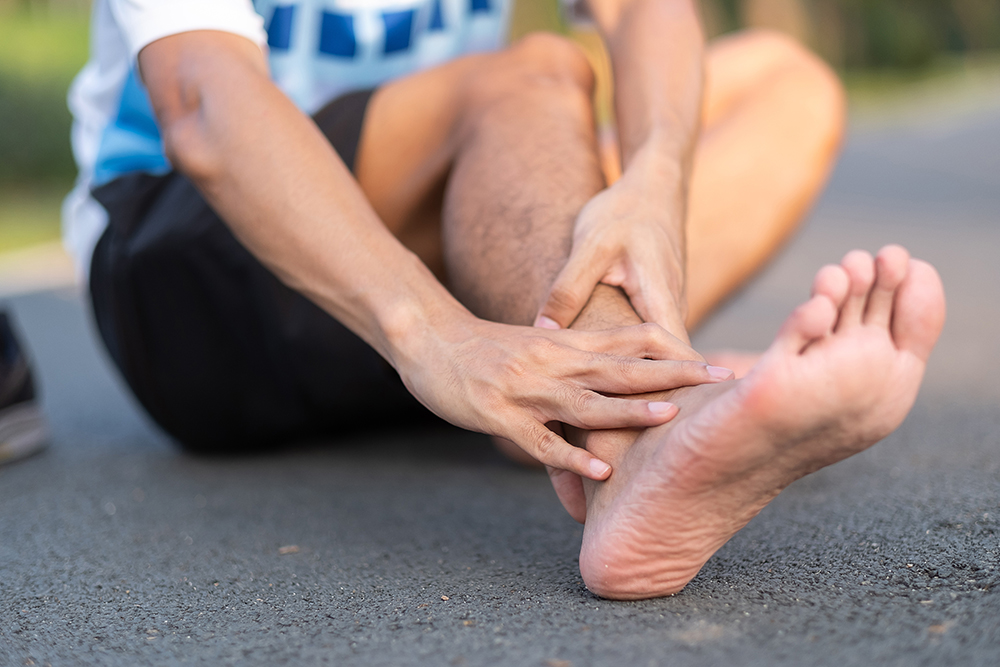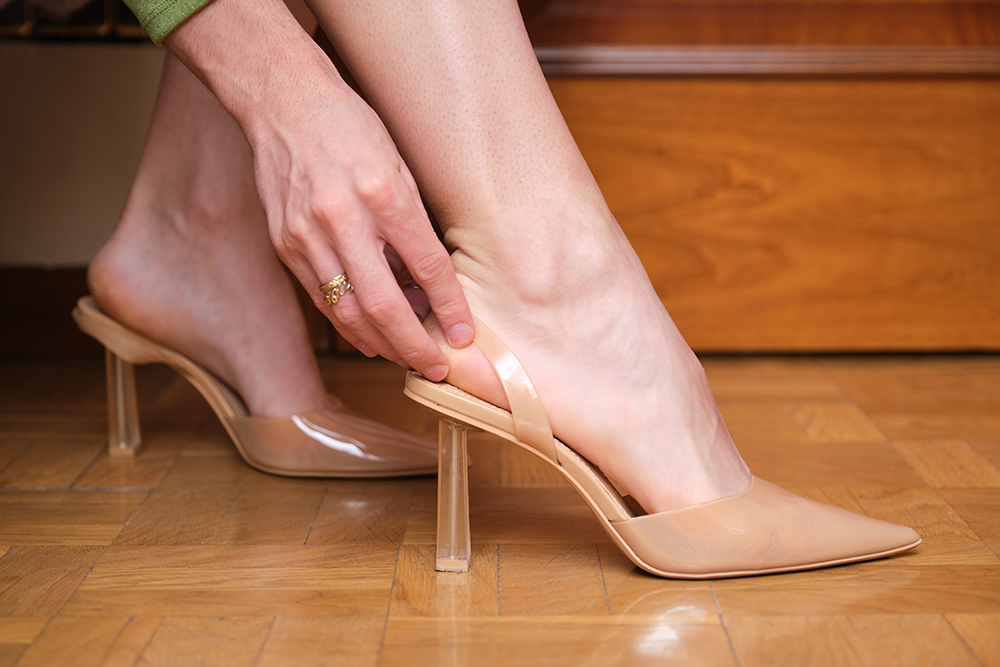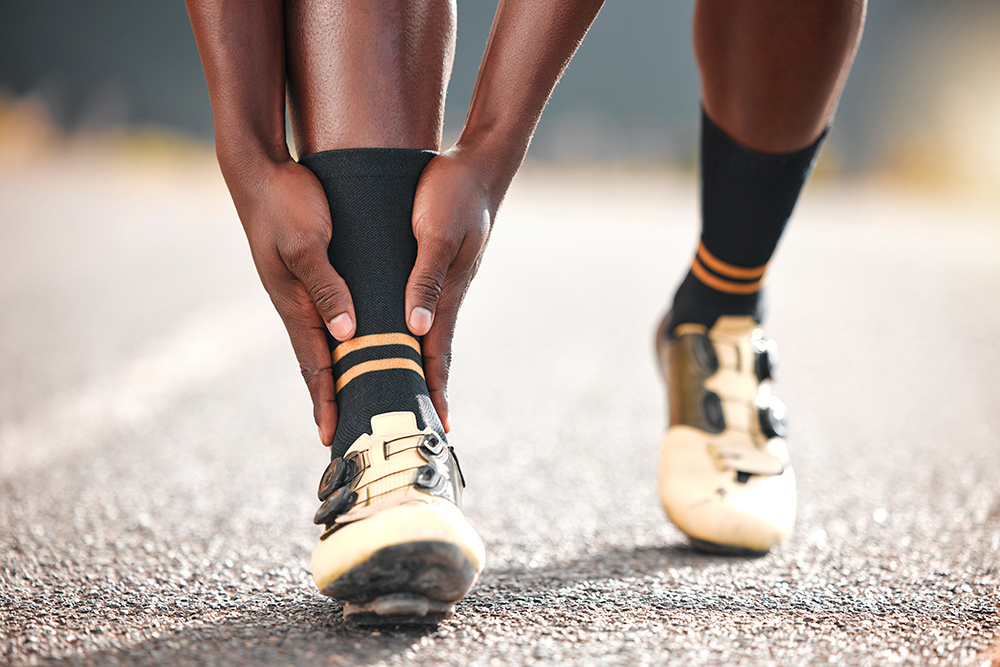Contents
Achilles tendinitis is a painful, common condition affecting the ankle’s Achilles tendon. The Achilles tendon is the largest tendon in the body and is located at the back of the ankle. It serves as a crucial connection between the calf muscles and the heel bone. It helps to make movements like walking, running and jumping happen. This condition is common among athletes, especially runners or those athletes who do sports that require frequent jumping and sudden stops. People who wear improper footwear or have flat feet are also at an increased risk of this condition. Recognizing the symptoms and seeking timely treatment for effective management is important.
Symptoms of Achilles tendinitis
Ignoring the symptoms of Achilles tendinitis can lead to persistent pain, reduced mobility and potentially severe complications. Symptoms include:
- Pain and stiffness — Persistent pain and stiffness in the back of your ankle, especially in the morning or after periods of rest, can be a sign of Achilles tendinitis. The pain in your ankle can also worsen during physical activities and ease up with rest.
- Swelling and tenderness — Common signs of inflammation along the Achilles tendon are swelling and tenderness along the tendon. The back of your ankle may also feel warm to the touch.
- Thickening of the tendon — The Achilles tendon may appear thicker than usual. It can be a sign of inflammation and a potential risk of rupturing if it is not quickly treated.
- Difficulty walking — Pain and stiffness can make it a challenge for you to walk. This can be more difficult when pushing off the affected foot. This difficulty can lead to a noticeable change in your gait.
- Creaking sensation — Some people report a creaking or crackling sensation when they move or touch their Achilles tendon. Feeling this sensation can indicate irritation and inflammation of the tendon sheath.
- Redness and heat — Inflamed tendons can cause the skin to become red and warm. These signs suggest an increased blood flow and inflammation in the affected area.
- Weakness in the leg — Weakness in your calf muscle can happen if you are plagued by persistent Achilles tendinitis. This leg weakness can affect your ability to push off the ground properly when you walk or run.
- Difficulty rising on toes — People with Achilles tendinitis can find it challenging to rise onto their toes or stand on tiptoe. This can be due to pain and the limited flexibility in their Achilles tendon.
If you are experiencing any of these symptoms, you mustn’t ignore them. Early intervention can help prevent the condition from worsening and promote quicker healing.
Causes of Achilles tendinitis
Achilles tendinitis can be caused by several factors:
- Overuse — Participating in repetitive activities without adequate rest can strain your Achilles tendon. This strain can lead to inflammation.
- Improper footwear — Ill-fitting shoes or high heels can change the natural alignment of your foot. This altered alignment can increase stress on your Achilles tendon.
- Sudden increase in activity — If you have a sudden increase in physical activities, such as jogging longer distances or increasing the intensity of your workout, it can cause a strain on your Achilles tendon.
- Tight calf muscles — If your calf muscles have insufficient flexibility, it can add pressure to your Achilles tendon. This added pressure can make it more susceptible to inflammation.
- Flat feet — People with flat feet or excessive pronation (where the foot rolls inward when they walk) can be at a higher risk of developing Achilles tendinitis.
Treatment options for Achilles tendinitis
Treating Achilles tendinitis needs a multifaceted approach, focusing on alleviating pain, reducing inflammation and strengthening the affected tendon. Common treatment options can include:
- Rest — Adequate rest is essential to the healing process. Avoiding activities that can aggravate the pain is also important.
- Ice — Applying ice packs to the affected area can help reduce inflammation and alleviate pain. Make sure to have a barrier between the ice pack and your skin to help prevent tissue damage from too long of exposure to the ice.
- Orthotic devices — Custom-made orthotic shoe inserts can help provide proper arch support. This support can help reduce stress on your Achilles tendon and improve symptoms.
- Medications — Over-the-counter medications like nonsteroidal anti-inflammatory drugs (NSAIDs) can help alleviate pain and reduce inflammation symptoms.
- Physical therapy — Physical therapy can be important in Achilles tendinitis management. Physical therapists use a variety of exercises to help strengthen your calf muscles, improve your flexibility and enhance your overall lower limb function.
Physical therapy treatments for Achilles tendinitis
As mentioned above, physical therapy is an important part of Achilles tendinitis management. It helps with healing and can help with long-term prevention. Physical therapists use evidence-based techniques to help address the condition and its symptoms. These techniques can include:
- Manual therapy — Physical therapists can use hands-on manual therapy techniques like soft tissue manipulation, joint mobilization, myofascial release and trigger point therapy. Soft tissue manipulation helps to reduce muscle tension, improve circulation and alleviate tightness in the affected area. Joint mobilization allows physical therapists to gently move the ankle joint within its natural range of motion. This helps improve joint mobility, reduce stiffness and promote proper alignment.
- Stretching and strengthening exercises — Tailored exercises intended to help stretch and strengthen the Achilles tendon and muscles can help boost endurance, reduce strain, improve flexibility and help prevent re-injury.
- Ultrasound therapy — Therapeutic ultrasound uses sound waves to generate heat that can penetrate deep tissue to help promote tissue healing. It can also help reduce inflammation and boost circulation around the affected area.
Don’t ignore Achilles tendinitis symptoms; visit Lattimore Physical Therapy today to find relief
At Lattimore Physical Therapy, we understand the challenges posed by Achilles tendinitis. Ignoring the signs and symptoms can cause you further complications and a longer recovery time. Our dedicated team of expert physical therapists can help guide you through your personalized treatment plan. By addressing the root cause of your Achilles tendinitis, we can help alleviate your pain and help you gain back your mobility. Don’t let Achilles tendinitis hold you back.
Contact our team today for more information or to schedule an initial appointment.



